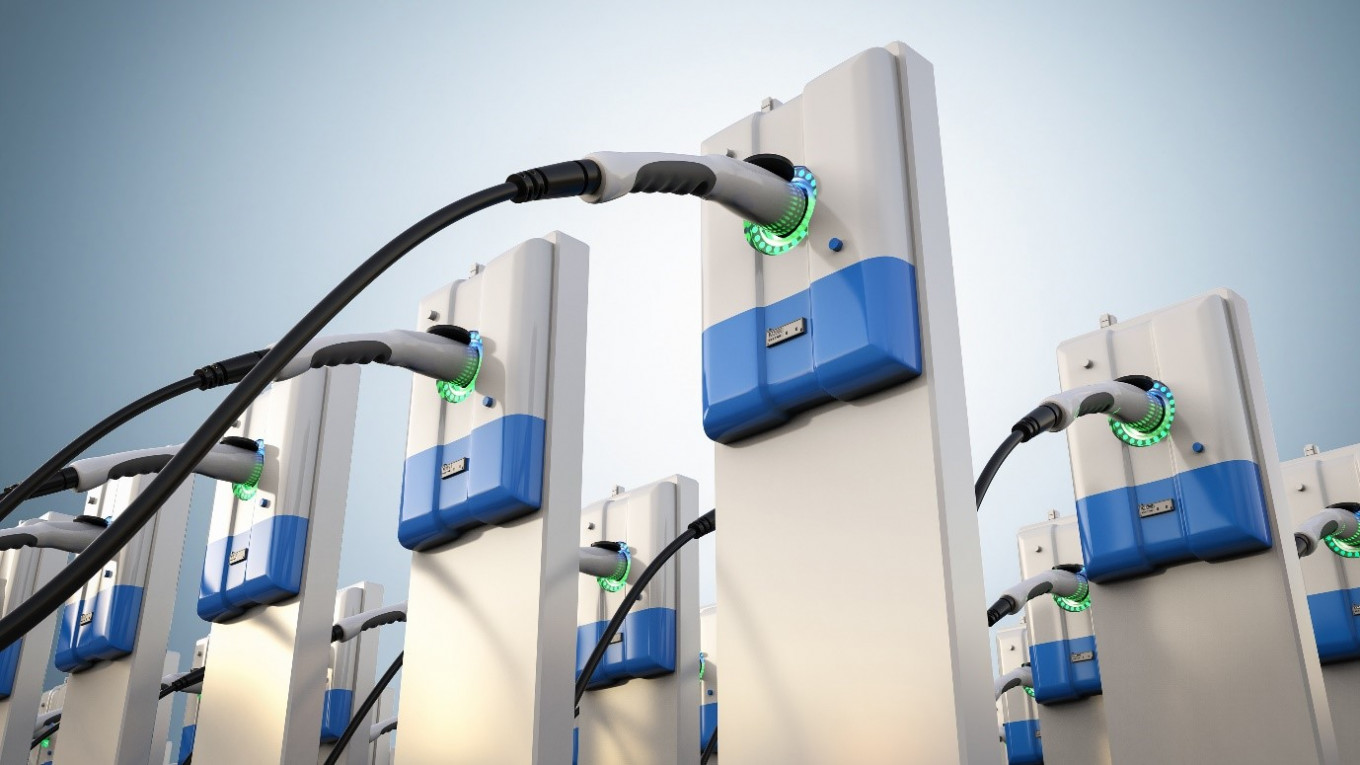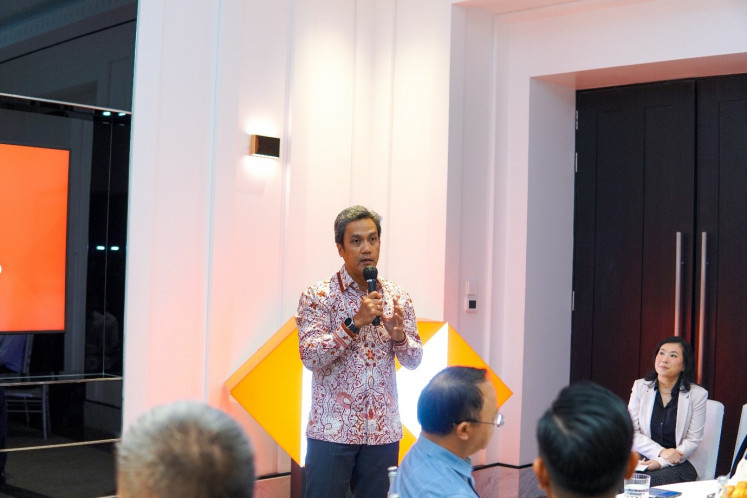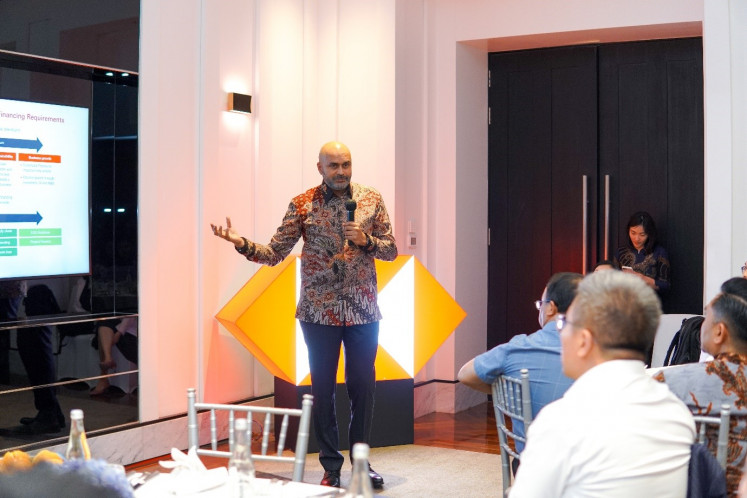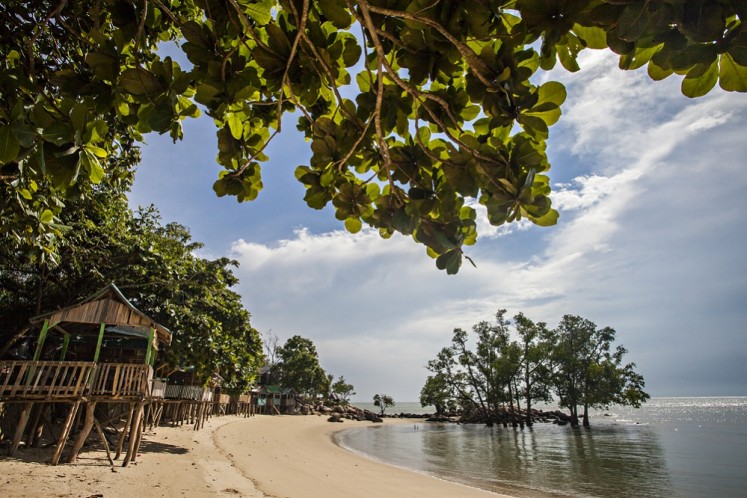Popular Reads
Top Results
Can't find what you're looking for?
View all search resultsPopular Reads
Top Results
Can't find what you're looking for?
View all search resultsSupporting development of Indonesia’s EV industry
Change text size
Gift Premium Articles
to Anyone
A
transformative shift toward electrifying the transportation sector in Indonesia has prompted the growth of the electric vehicle (EV) ecosystem, which provides promising business opportunities for both local and overseas investors.
The shift from internal combustion engine (ICE) vehicles to EVs will help in reducing carbon emission from transportation sector, which also contribute to Indonesia’s overall net zero target.
According to a report released by McKinsey, Asia Pacific is responsible for 50 percent of annual global greenhouse gas (GHG) emissions and represents the biggest opportunities, with a potential US$4 – 5 trillion by 2030 across 11 sectors. Of the 11 sectors, transportation ranks top with an estimated $1.1 trillion, followed by power with $800 billion and construction with $570 billion.
Alongside global sustainability initiatives, Indonesia’s growing trend in switching to green transportation is also affirmed by the government’s commitment to achieving its net-zero emissions (NZE) target.
Indonesia's NZE Road Map for the Energy Sector 2060 mandates that the transportation sector emission levels in 2060 should not exceed 52 million tonnes of carbon dioxide, according to the Energy and Mineral Resources ministry.
As the biggest economy in ASEAN, natural resources-rich Indonesia with a population of approximately 270 million is home to more than 125 million motorcycles and more than 17 million cars.
President Joko “Jokowi” Widodo said at the final series of programs at the ASEAN Summit 2023 that ASEAN agreed to build an EV ecosystem and serve as a key part of the global supply chain and therefore developing a downstream industry is of paramount importance.
Indonesia’s ambition to develop EV hub is strongly backed up by the country’s abundance in natural resources, particularly nickel, a critical resource for EV batteries.
This explains why many companies, including transportation-related manufacturers, are embedding sustainability into their strategy to support an eco-friendly transportation sector.
Dannif Danusaputro, chairman of the Electric Mobility Ecosystem Association (AEML) revealed that the switch to EVs from ICE vehicles has been driven by the rising demand, increasing supply and a supportive regulatory framework, among the key factors of the EV ecosystem growth.
Data from the AEML show that the number of two-wheeled EVs surged by 262 percent to 62,409 in 2023, compared with 17,198 in 2022; while the number of four-wheeled EVs rose by 43 percent to 12,248 in 2023, compared with 8,562 in the previous year.
Indonesia has set the target of 12 million for both two- and three -wheeled EVs and 1 million four-wheeled EVs, e-bus and commercial EVs on the country’s roads by 2035.
The target is expected to contribute to reducing fossil fuel consumption by 21.65 million barrels, or the equivalent of reducing CO2 emissions by 7.9 million tonnes in total.
“The need to electrify transport has never been more urgent, and this overhaul represents a massive opportunity to transform our future and reduce our dependence on fossil fuels. Already, a number of countries in Asia have been providing strong policy support to the EV industry through incentives and subsidies,” comments Sunil Veetil, Head of Commercial Banking Sustainability, Asia Pacific at HSBC.
The rapidly growing EV ecosystem in Indonesia has also been driven by various strategic policies from the government, including providing business certainty, a road map and optimizing the domestic component level (TKDN).
In accordance with the mandate of Presidential Decree 55/2019, the government is also providing incentives to consumers and the manufacturing industry.
Incentives for consumers include zero percent luxury sales tax (PPnBM), government-borne value-added tax (PPN DTP), and transfer of motor vehicle ownership (BBNKB) fees; low-interest rates and zero percent down payments; discounts on electricity use; special number plates; and incentives for purchasing two-wheeled EVs amounting to Rp 7 million.
Incentives for the manufacturing industry include tax holidays, mini tax holidays, tax allowances, import duty facilities, government-borne import duties and super tax deductions.
In terms of EV infrastructure, Indonesia has also made headway, with charging stations reaching 1,380 units as of April 2024, and battery-swapping stations totalling 2,182 units as of the same period.
The increase in EV adoption, supported by Indonesia's vast natural resources and the government’s ambitious target for EV production, presents a promising opportunity for the automotive industry.
Green financing
In line with the sustainability strategy that companies embrace, funding requirements are required to support the capacity expansions to meet the forecasted demand in the next decade.
A number of local and multinational companies are in partnership with international bank. HSBC as green financing of the EV sector and its value chain aligns perfectly with the bank’s sustainability strategy.
Veetil comments, “As a global organisation with a presence in 62 markets, including the six largest economies in ASEAN, HSBC is well placed to help grow the EV ecosystem and help Indonesia’s transition to net zero.”
As an international bank with 140 years of experience in Indonesia and strong international connectivity, which spans globally over 60 countries, HSBC provides financial advisory, green and sustainability financing for capital expenditure (CAPEX) funding for expansion by both domestic and overseas borrowers, acquisition financing for mergers and acquisitions (M&A), construction of battery energy storage capacity and construction of EV infrastructure such as charging points.
In the context of downstream industry development related to the EV sector, HSBC has been supporting FDI to Indonesia.
HSBC has also been supporting Indonesia’s state owned enterprises in a few landmark deals.
With regard to supporting growth of the EV industry, HSBC has helped local and two foreign companies to construct greenfield EV lithium-ion battery manufacturing facilities in Indonesia.
Furthermore, HSBC has also provided green loan to support Indonesia’s leading transportation company to expand their electric vehicle fleet, as well as supporting a multifinance company to provide financing for EV cars.
Veetil concludes, “South and Southeast Asia, with an abundance of the natural resources required in the transition, as well as the expertise in making batteries and building EVs, stands to benefit from the electrification of transport. We expect Indonesia to play a major role in the EV ecosystem and capture the EV and battery value-chain opportunity.”
Source: HSBC












